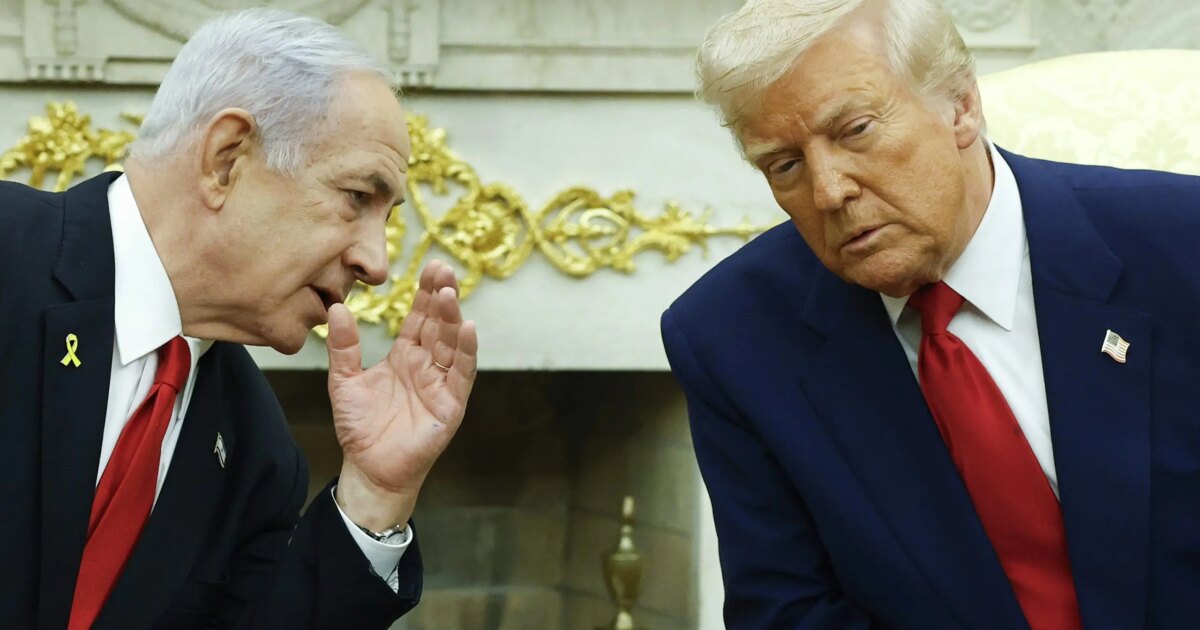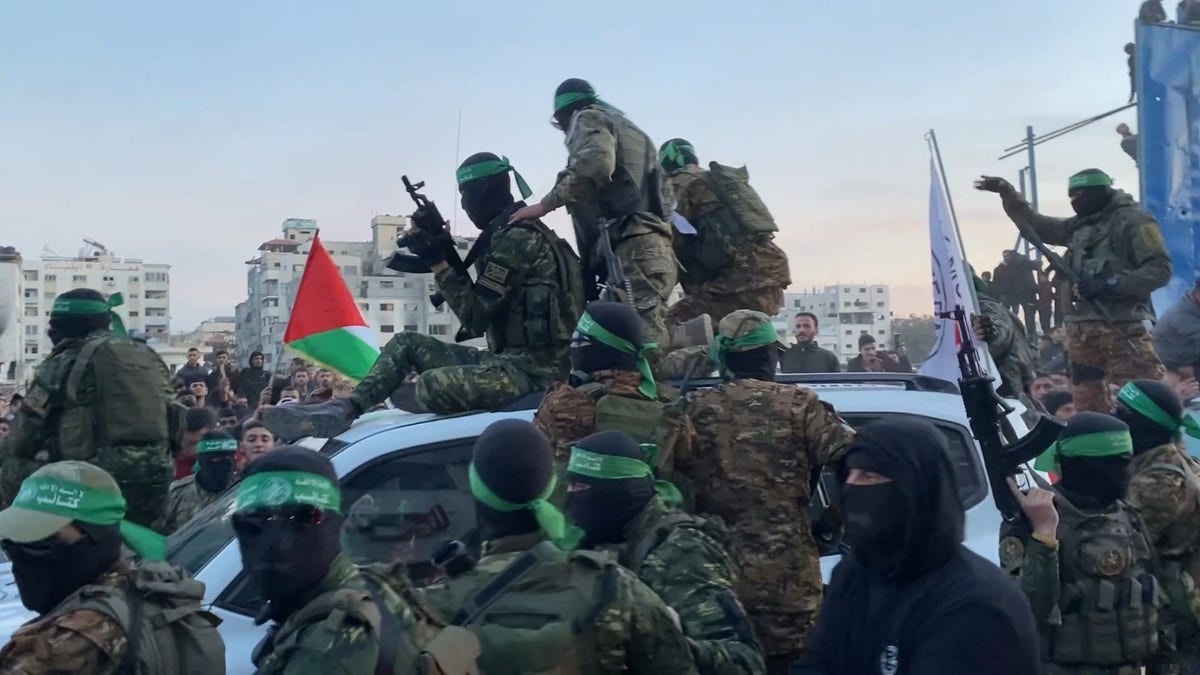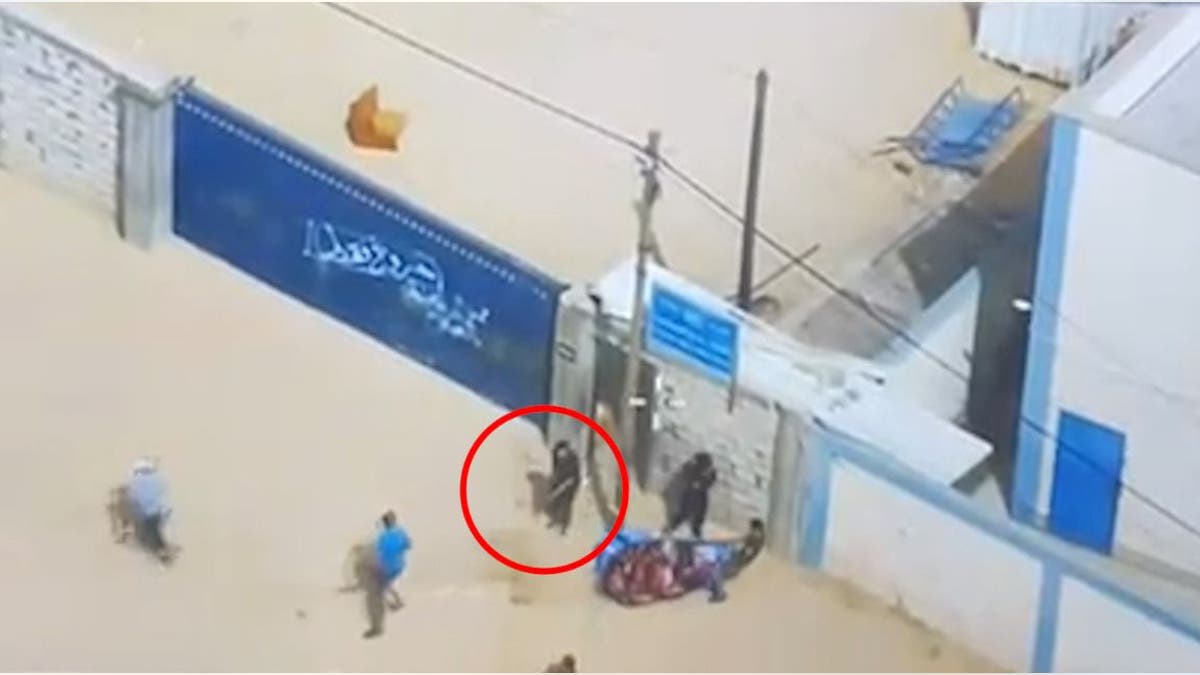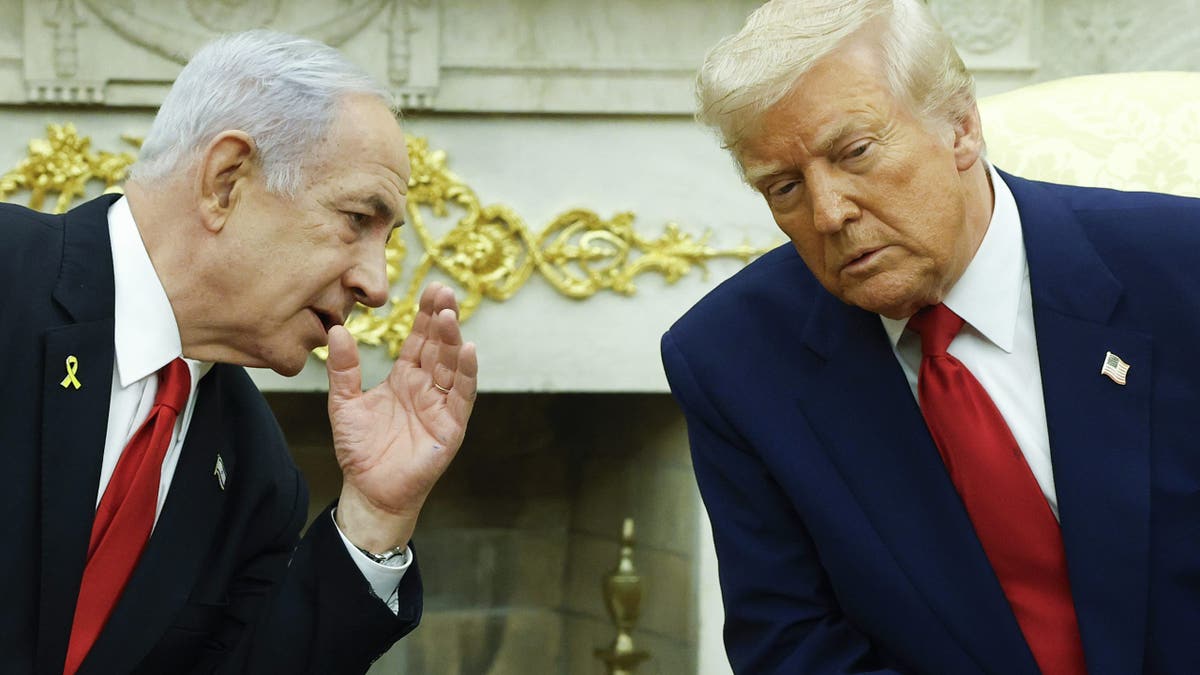Trump-Netanyahu talks expected to address question of Gaza without Hamas

NEWYou can now listen to Fox News articles!
President Donald Trump and Israeli Prime Minister Benjamin Netanyahu are set to meet at the White House on Monday. One of the most difficult questions on the table is what Gaza might look like without Hamas.
Experts tell Fox News Digital that while the need for an alternative is clear, almost every proposed solution comes with serious structural, political and security limitations.
John Hannah, a senior fellow at the Jewish Institute for National Security of America (JINSA) and veteran of both Republican and Democratic administrations, said building an alternative to Hamas must happen in parallel with dismantling it.
THE HISTORY OF GAZA AMID TRUMP’S PLAN TO REBUILD ENCLAVE

Hamas terrorists emerge from the shadows as they surround Red Cross vehicles. (TPS-IL)
“Part of how you win is by showing there’s a viable alternative,” Hannah said. “People need to see there’s a future beyond Hamas”
That future, experts believe, lies in a non-Hamas technocratic government – comprised of Palestinians unaffiliated with either Hamas or the PLO – backed by a coalition of key Arab states, including Saudi Arabia, Egypt, Jordan and the UAE.
“While a new administration in Gaza should be independent, some symbolic link to the Palestinian Authority could enhance its legitimacy with the Arabs. Perhaps Ramallah could serve as a pass-through for paying salaries. But the PA won’t call the shots,” Hannah said.
“The default right now, if Israel ends up leaving Gaza, is Hamas,” said Ghaith al-Omari, senior fellow at the Washington Institute for Near East Policy. “There is no one on the ground who can challenge them. And there is no Arab involvement without the defeat of Hamas. Not just a ceasefire – actual disarmament.”

Palestinians carry bags and boxes containing food and humanitarian aid packages delivered by the Gaza Humanitarian Foundation, a U.S.-backed organization, in Rafah, southern Gaza Strip, June 16, 2025. (AP Photo/Abdel Kareem Hana)
At best, said al-Omari who served as the former executive director of the American Task Force on Palestine, the PA might offer a “kosher stamp” to satisfy Arab states, which have made clear they will only intervene in Gaza under a Palestinian national umbrella.
TRUMP PRESSURES ISRAEL TO END GAZA CONFLICT AS HE EYES ABRAHAM ACCORDS EXPANSION
“Without that symbolic PA invitation, Egypt and others won’t come in,” said al-Omari. “But they still need a political framework – some commitment to a two-state solution. Without that, they have absolutely no incentive to play a role in Gaza.”
Securing Israeli approval for any new Gaza administration is another major hurdle. An Israeli security official told Fox News Digital that any deal would need to include guarantees that Israel retains counterterrorism access to prevent Hamas from reemerging.
“Something like what exists in the West Bank – buffer zones, perimeter security, and the right of the IDF or Shin Bet to act on intelligence when needed,” Hannah said.

IDF forces operating in Rafah, in the Gaza Strip. (IDF Spokesman’s Office)
That framework, he noted, would require intensive American-led diplomacy with sustained presence and coordination.
“I can’t see anyone else but the United States doing it – there are too many inner-Arab rivalries,” Hannah said, “No other actor has the relationships, resources or trust required to bridge the deep divides between Israel, Arab states and international players. Everyone’s going to want the U.S. at the center of this. And there’s no doubt President Trump wants to solve it.”
“Qatar is the elephant in the room,” said Hannah, “They bring a lot of much-needed money, but they’ve had a deeply problematic relationship with Hamas. If they want a seat at the table, it has to be with strict conditions – money flowing through trusted, externally controlled channels. But they can’t be a key player in this effort.”
The United Nations, meanwhile, is largely out. “UNRWA’s days are over,” said Hannah. “They can’t run education or the economy in Gaza anymore. At most, the U.N. might endorse a U.S.-Arab-Israeli plan with a Security Council resolution – but they won’t play an operational role.”

One piece of footage published by the Israel Defense Force reportedly shows Hamas combatants firing weapons from the entrance to the UNRWA compound. (IDF)
AMERICAN VETERANS ATTACKED, INJURED WHILE DISTRIBUTING AID IN GAZA WITH US-BACKED GROUP
One proposal gaining quiet traction in Israeli and American circles is the idea of empowering local clans to establish self-governing enclaves.
Joseph Braude, president of the Center for Peace Communications, has spoken extensively with activists on the ground and believes this model could mark the beginning of an alternative.
“It may not be realistic to talk about one civil administration managing all of Gaza right now,” Braude said, “But in discrete geographical enclaves within the strip, you can pilot non-Hamas self-rule. Local Gazans patrol internally while the IDF or another force secures the perimeter. “
“There’s a fiber of educated, civically minded individuals in Gaza – from engineers to teachers – who are not Islamists,” he added, “If vetted properly, they can manage administration, education and basic services. But you have to start by identifying who they are and what they actually believe.”
Braude pointed to one such case: Yasser Abu Shabab, a local militia leader. “This is the first anti-Hamas militia to emerge in Gaza in a generation. He’s a local fighter from a Bedouin clan with family ties to Egyptian forces battling ISIS in Sinai. He says he wants to invite civil servants to begin staffing an administration.”

Israeli Prime Minister Benjamin meets with President Donald Trump in the Oval Office of the White House on April 7, 2025. (Kevin Dietsch/Getty Images)
But not everyone agrees this is feasible. “These groups are fragmented, displaced and lack the legitimacy or cohesion to govern,” said al-Omari. “You might use these militias to secure aid deliveries in a specific area, but they can’t form the basis of governance.”
Dr. Michael Milstein, head of the Forum for Palestinian Studies at Tel Aviv University, told Fox News Digital, “Since the war began, several attempts to promote clans as an alternative to Hamas have also failed, like the Doghmush clan, whose leaders were executed by Hamas in early 2024.”
“Even now, figures like Abu Shabab in Rafah or the Barbakh family in Khan Younis are fringe cases,” Milstein added. “Hamas still controls most of the public space. Clans may offer localized solutions, but they are no cohesive or legitimate alternative. Many are openly loyal to Hamas.”
CLICK HERE TO GET THE FOX NEWS APP
“Many say, until Palestinians teach their children to love themselves more than they hate Israel, there will never be peace,” Braude said, “That’s true. But who is actually working to foster a Palestinian leadership [that] does so? That’s the challenge – and the opportunity – right now.”
